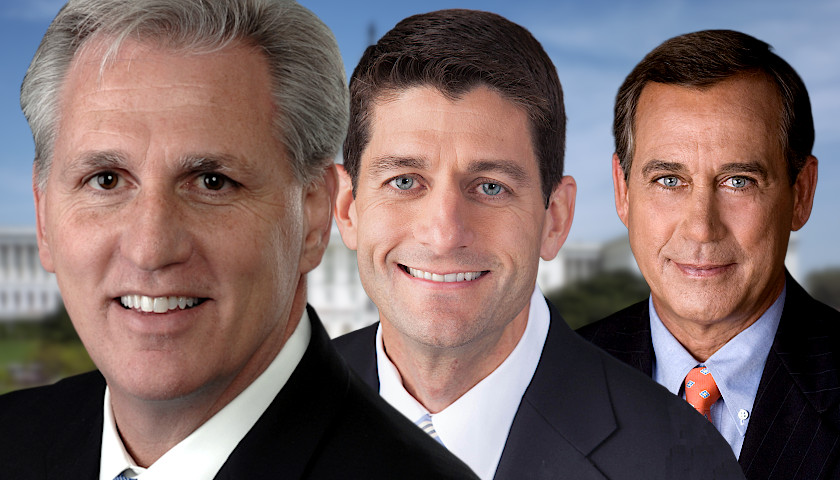by CHQ Staff
Fiscal conservatives on Capitol Hill became a Class 6 species once Republicans regained the majority back in 2010 – they weren’t confirmed to be extinct – but somewhat like the Ivory Billed Woodpecker their continued existence could not be confirmed by means other than faint recordings of their presumed calls.
And when one did blunder into the open, as Rep. David Schweikert (AZ-6) did back in 2012 he was quickly hunted down, stuff and mounted – or more correctly taken off the House Financial Services Committee in retaliation for voting against leadership, especially on spending.
President Trump’s first budget proposals were informed by the long-out-of-style received wisdom of fiscal conservatives, but like President Reagan before him, he went along with the Capitol Hill GOP’s appetite for massive deficits to get what he wanted – money to rebuild the military and a promise of funds to build the border wall.
And like Reagan, Trump got some of the money he wanted for some of what he wanted.
This fiscal year President Trump has proposed a budget that Democrats have already pronounced as dead on arrival, but he is no longer saddled with the need to go along with the spending priorities of a spendthrift Capitol Hill Republican majority – he can, and should, demand fiscal discipline from the Democrat-controlled Congress.
As our friend Acting OMB Director Russ Vought reminded us in an op-ed for Fox News:
It is no secret that our nation’s $22 trillion debt, which nearly doubled under the Obama administration, is unsustainable. The Congressional Budget Office warned just weeks ago that, if left unchecked, our national debt would “reduce national saving and income, boost the government’s interest payments, limit lawmakers’ ability to respond to unforeseen events, and increase the likelihood of a fiscal crisis.”
Understanding this threat, noted Mr. Vought, President Trump on Monday unveiled “A Budget for a Better America,” a new outline for government spending that invests in critical national priorities while restraining spending to give taxpayers the best value for their tax dollar.
In total, the president’s 2020 Budget keeps his promise of a 5 percent cut to non-defense discretionary spending, reduces deficits by over $2.7 trillion over 10 years, and balances the budget in 15 years, by 2034.
Since his first year in office, and again in the budget we are laying out, said Vought, President Trump has pushed for more reductions to wasteful Washington spending than any other president in history. Unfortunately, Congress has repeatedly ignored these taxpayer savings and plowed ahead with irresponsible budgets that increase our deficits and size of government. This needs to stop.
In other words, it’s not that Americans are taxed too little, it’s that Washington spends too much.
As our friend Terence P. Jeffrey reported for CNSNews, “The federal government collected a record $1,683,537,000,000 in individual income taxes in fiscal 2018 (October 2017 through September 2018), according to the Monthly Treasury Statement” released at the end of the fiscal year.
However, reported Jeffrey, the statement confirmed the federal government also ran a deficit of $778,996,000,000 during the same fiscal year. The federal government ran a deficit for the fiscal year because while collecting $3,328,745,000,000 in total taxes it turned around and spent $4,107,741,000,000.
The President’s budget sets an achievable goal for bringing spending and revenues into balance, but it is a goal that we have seen before, most recently from former Speaker of the House Paul Ryan when he was Ranking Member and then Chairman of the House Budget Committee.
The balanced budget plan Ryan developed helped make his reputation as a boy genius, but it was all a bunch of baloney, because when Ryan finally attained the Speaker’s gavel and had the power to make his budget plan a reality, he never lifted a finger to do so.
President Trump’s budget is an excellent blueprint for reorganizing government, gaining many efficiencies and it funds the wall and the continued rebuilding of our military. However, it is only as good as the President’s willingness to fight for it by vetoing Democrat deficit spending bills and holding the Capitol Hill GOP’s feet to the fire to sustain those vetoes.




